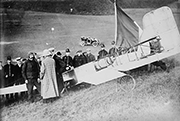E-Archive
Off the Beaten Track
in Vol. 20 - November Issue - Year 2019
Prizes

Alfred Harmsworth

Louis Blériot after landing at Dover
Although it was a chilly morning in London in October 1906, the man’s face grew hotter by the minute. Nostrils flaring, he clamped down on his cigar. He muttered to himself as his eyes flew over the newspaper article. A few days earlier, a Brazilian by the name of Alberto Santos-Dumont had made the first powered flight in Europe, flying his 14-bis aircraft on a circuit in Paris. How could it be that France and Germany were making such great progress in manned flight, while his own country was doing nothing? He dropped the newspaper to the floor as he brooded.
****
By the beginning of the 1900s, Alfred Harmsworth had become one of the wealthiest entrepreneurs in the United Kingdom. His success was based on a huge publishing empire that included several newspapers and periodicals. In addition to founding new publications, he bought several failing newspapers and merged them into a highly profitable media conglomerate. He also published schoolbooks, dictionaries and encyclopedias. With money came power. Harmsworth exercised great political influence on the ruling class and swayed public opinion on social and economic matters of the day. He was good at interpreting people’s moods and he made sure that his publications delivered whatever the public wanted.
Harmsworth was fascinated by the achievements of French, German and American pioneer aviators and very disappointed that nothing similar was being done in his own country. Sensing that the initiative could attract many readers, he decided to encourage the development of aviation in Great Britain by offering prizes through the Daily Mail, a newspaper he founded in 1896.
The Daily Mail announced its first aviation prize a few days after Alberto Santo-Dumont’s flight in Paris. The incredible sum of £10,000, equivalent to over a million pounds in today’s currency, would be awarded for the first flight from London to Manchester, a distance of 195 miles. Contestants were to complete the journey within twenty-four hours, with no more than two landings along the way. Start and finish had to be within five miles of the Daily Mail office in each city. In 1906 this was considered an impossible feat, since the best pilots at that time could stay in the air for only a few seconds. However, by 1910 progress in aviation technology allowed the French pilot Louis Paulhan to claim the prize, after beating the British contender Claude Grahame-White. Paulhan spent four hours and twelve minutes in the air and arrived in Manchester twelve hours after taking off from London, with an overnight stop in Lichfield.
In October 1908 the Daily Mail announced a £500 prize for a successful crossing of the English Channel in a heavier-than-air aircraft. The year 1908 ended with no serious attempt being made, so the prize money was doubled to £1,000 and the offer extended to the end of 1909. The event was the subject of great public interest, spawning crowds of 10,000 spectators at Calais and just as many at Dover. The Marconi Company set up a special radio link for the occasion, with one station on Cap Blanc Nez and the other on the roof of a hotel in Dover. On the morning of July 25th 1909, the Frenchman Louis Blériot took off from a farm near the beach at Calais. He flew at about 45 mph and at an altitude of about 250 feet. With poor visibility and no compass or radio, he struggled to get his bearings. Blériot completed the crossing in 36 minutes and 30 seconds and made a hard landing near the castle at Dover, damaging his undercarriage. A huge crowd gave him a hero’s welcome. Back in London, the circulation of the Daily Mail skyrocketed.
In April 1913 the Daily Mail announced a new aviation prize for crossing the Atlantic Ocean from North America to Great Britain or Ireland in 72 consecutive hours. The competition was suspended with the outbreak of war in 1914, but in June 1919 Englishmen John Alcock and Arthur Brown claimed the rich £10,000 prize and were knighted by King George V.*
The last prize was awarded in 1930 to Amy Johnson for the first solo flight by a woman from England to Australia, which she completed in nineteen days.
From 1906 to 1930, the Daily Mail organized nineteen aviation prizes, awarding a total of over £4,700,000 equivalent in today’s currency, plus an additional £613,000 in consolation prizes.
Upon his death in 1922, the Daily Mail publisher Alfred Harmsworth left three months’ pay to each of his 6,000 employees.
*See Off the Beaten Track, September 2019
By Giovanni Gregorat, Contributing Editor MFN




























